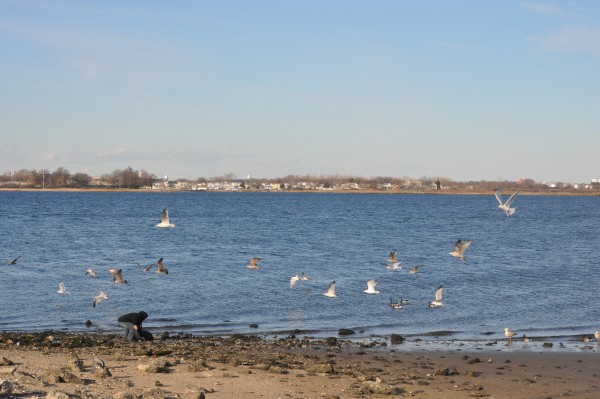
A new law prevents regulatory agencies from issuing permits to allow toxic dumping into Jamaica Bay’s borrow pits. File Photo
Gov. Andrew Cuomo’s signature turned legislation looking to protect Jamaica Bay from toxic dumping into reality this week.
State Sen. Joseph Addabbo (D-Howard Beach) and state Assemblyman Phil Goldfeder (D-Rockaway Park) teamed up to draft a bill that prohibits state agencies from giving green lights to any projects that might dump hazardous materials into Jamaica Bay’s borrow pits.
“Communities surrounding Jamaica Bay can now breathe a little easier with the passing of this bill, both figuratively and literally. In the Legislature, we fought for this because our backyards and the beautiful bay waters are not a dumping ground for hazardous waste. Life in the water, on the water and around the water must be preserved,” Addabbo said. “In the district, we were all fortunate enough to grow up with Jamaica Bay and I hope this legislation will ensure future generations can enjoy the serenity and beauty for years to come.”
The lawmakers said the new legislation would limit the risk of water contamination in southern Queens and its surrounding communities. Before Cuomo gave the bill his blessings, the state’s Department of Environmental Conservation did not have any guidelines when it came to state waters, which includes Jamaica Bay.
Environmental advocates came out in support of the new law, calling it a much-needed end to a legislative loophole that threatened waters, including Jamaica Bay, for more than three decades.
“The current regulation that allows contaminated fill to be placed in the waters of the bay has attracted numerous ill-conceived plans that are possibly driven by huge potential financial benefits to a few, while potentially destroying the bay forever,” said Dan Mundy Jr. of the Jamaica Bay Ecowatchers. “This legislation will end these plans and the threats they pose for good.”
Under the new law, the state DEC was barred from issuing permits that would allow any room for toxic dumping into Jamaica Bay’s borrow pits, which includes a number of spots throughout the bay that have larger depths because of previous projects there. Over recent years, the Army Corp. of Engineers has been dredging the bay floor and removing sand to fill in adjacent areas, leaving the waterway more vulnerable to environmental attack, lawmakers said.
But for now, drinking water is safe – or at least safer – thanks to the law, officials said.
“This legislation is a huge victory for our families in Broad Channel and every community surrounding Jamaica Bay,” Goldfeder said. “This law will not only protect the waters of Jamaica Bay from hazardous dumping, but also ensures that thousands of endangered bird species and wildlife remain safe. Jamaica Bay is not only an environmental resource but has become an economic engine in southern Queens.”
By Phil Corso
